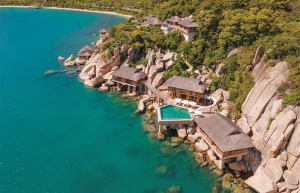Sustainable tourism no longer a temporary trend in Vietnam
According to the Sustainable Travel Report 2023 conducted by Booking.com based on the results of a survey of 33,000 travellers from 35 countries and territories worldwide, 80 per cent of travellers say that sustainability is increasingly important to them.
 |
| Sustainable tourism no longer a temporary trend in Vietnam |
In which, 97 per cent of Vietnamese tourists participating in the survey want to travel sustainably within the next year. Three-quarters of them are willing to pay more for certified sustainable travel options, as a way to ensure they are making a positive impact.
The report also said that Vietnamese tourists are actively looking for loyalty programmes and discounts, along with sustainable travel options to satisfy their personal budgets. Almost 80 per cent said they feel more secure staying at accommodation that is awarded a certification, or has a sustainability badge.
These changes in travel habits also require destinations and accommodation establishments to rapidly change in response.
After graduating from university with a degree in biotechnology engineering, Dinh Thu Huong chose to start a business in tourism. Huong is currently the owner of Lalita Tam Coc Resort & Spa, a resort facility located near the Tam Coc tourist area of Ninh Binh province, which has just been awarded a sustainable tourism badge from Booking.com.
She said that her knowledge in the field of biotechnology has had a great impact on her product thinking and the development of her tourism model.
“I always put the environment, people and eco-friendly factors first when choosing a business development location,” Huong said. “That is why I decided to build a resort in a location far from the city, residential areas, completely quiet and surrounded by limestone mountains, the typical natural scenery of Ninh Binh,” she added.
Not only restricting concreting in the design so as not to affect the surrounding landscape, Lalita Tam Coc also pays great attention to saving energy sources and limiting plastic waste into the environment. The resort only uses up to 80 per cent of LED capacity, directing the natural groundwater from the mountain to use, encouraging visitors to use cloth towels instead of paper towels and use bicycles to visit instead of motorbike or car.
The sustainability factor is also reflected in the focus on developing human resources with regularly held training courses, prioritising the use of local human resources and providing good working conditions for them.
“We have saved a lot of costs when operating in a sustainable way. Human resources are also stable and have been with us since our establishment,” said Huong.
Sustainable tourism is no longer a fad but has become a requirement for the vast majority of tourists globally, including Vietnam.
There are now more than 550,000 properties worldwide that receive a sustainable travel badge from Booking.com. In which, Vietnam has about 5,000 establishments, mainly in destinations including Ho Chi Minh City, Hanoi, Danang, Dalat, Nha Trang, Hoi An, Phu Quoc, Quy Nhon, Halong, and Vung Tau.
These accommodation facilities not only help visitors enjoy a great stay, but also actively take measures to reduce their impact on the environment, use renewable energy sources and strive to bring benefits to the local community.
The travel report indicates that the number of accommodation establishments receiving the sustainable travel badge this year increased seven times compared to last year, making Vietnam fifth in the Asia-Pacific region in terms of the number of accommodation establishments receiving one.
However, the transition from a normal model to a sustainable operating model will also cost a certain amount, while not all accommodation establishments are willing to accept it if it is not visible yet. Meanwhile, Vietnam currently has 38,000 such establishments, but mostly small- and medium-sized.
Meanwhile, at a consultation meeting to kick off the Swiss Tourism for Sustainable Development in Vietnam (ST4SD) project last week, Kenneth Wood, director of ST4SD commented, “Tourism development without the participation of the private sector is like medical development without the participation of doctors. Therefore, projects supporting model transformation need to come up with a synchronous plan with close cooperation between management agencies and the business sector.”
ST4SD is a project funded by Switzerland’s economic development cooperation with more than $3.5 million to develop sustainable tourism models in some localities in the country towards 2027.
Kenneth added, “The project does not aim to change the operating model of large corporations because they have their own path, but will focus on the small and medium-sized enterprises operating in the tourism industry.”
Despite some obstacles, the transition to a sustainable tourism model is still taking place slowly in Vietnam, starting with a change in tourists’ consciousness.
According to research by Deloitte, Generation-Z is adopting more sustainable behaviours than any other group. Half of Gen-Z consumers reduce their purchases, and 45 per cent stop buying certain brands because of concerns about sustainability or ethics. The study indicates that the youngest generations feel more motivated to reduce the impacts of climate change and pollution.
Dang Xuan Son, chairman of the Vietnam Responsible Tourism Club said, “Sustainable tourism is an urgent choice in Vietnam, to inspire and motivate to protect the environment, eliminate the carbon footprint and leave lessons on preserving community cultural values. If Vietnam can create a sustainable tourism brand, it can attract more international visitors.”
| Ha Van Sieu - Deputy director general Vietnam National Administration of Tourism
Sustainable tourism is both a trend and a mandatory requirement because after the pandemic, the tourism industry in all countries has shifted towards developing in-depth quality, promoting local traditional cultural values, and minimising the use of resources and bringing maximum benefits to the community. In Vietnam, many localities have now built new tourism models, encouraging green tourism development ideas, using local resources, materials and labour in tourism activities. Some businesses have pioneered the implementation of these ideas by putting the visitor’s experience at the centre, closely linking with the government and the residential community to replicate these models. The Vietnam National Administration of Tourism has also made a preliminary assessment of destinations that are developing low-impact tourism successfully. But beside the assessment of the management agency, it is the visitor’s assessment that is the most objective and practical. For example, in a Quang Ninh, a number of tourist destinations are being appreciated by tourists for their sustainability, such as Yen Tu and Binh Lieu. In Halong, to successfully convert this model, there are still many problems that need to be tackled. The goal of the tourism industry going forward will be to focus on promoting activities that bring the best experiences for visitors and practical benefits for the people. Besides exploiting this potential, Vietnam needs to effectively use tourism resources, as well as preserve and effectively promote local cultural values to add value to tourist products. Do Quang Huy - Representative Swiss State Secretariat for Economic Affairs
Switzerland is a successful lesson in sustainable tourism development and also has many similarities in terms of landscapes and diverse ecosystems that we can learn from. In Switzerland, these tourism models are managed by small- and medium-sized enterprises, while the number of such businesses operating in Vietnam’s tourism industry accounts for more than 70 per cent. Some destinations in our country are very suitable to study the greener tourism models of Switzerland, such as Ha Giang, heritage sites in Hue or Hoi An, or agricultural tourism models in the Mekong Delta. Tourist areas in Switzerland are well planned and divided according to residential areas, tourist areas and routes based on specific conservation and development principles. Vietnam can also access knowledge on low-impact tourism development planning, model building and products through accessing projects being supported by Switzerland. I believe that the policy of encouraging the contribution of the private sector is the decisive factor for the success of sustainable tourism. A project cannot succeed without resonance from many partners, especially the private sector and digital platforms. The issue of public-private dialogue is also a strong point to stimulate competition and innovation, ensure that policies are made in accordance with the operation of enterprises, helping them improve their competitiveness. In 2017, Vietnam launched a tourism policy that incorporates these elements. The recent marketing policy of the tourism industry also introduces models and makes requirements for sustainable tourism. But for businesses to put this into practice, we still have a long way to go because they have not seen the specific benefits of such tourism practices. In the process of contacting projects, I found that convincing businesses to agree to switch from the current model to a more green direction was not too difficult, but it requires them to be really persistent because of its benefits may only come in the long term. Before the pandemic, the tourism industry was proud of its sales, the number of visitors, everything was running well, and it did not see the need to change. But the shock from the pandemic and the economic recession has seen sustainable tourism mentioned much more. The private sector therefore also has to find new ways of doing things and repositioning for the right business model. |
 | Laying focus on sustainable tourism The total revenues of Vietnam’s tourism in 2022 was approximately $19.6 billion – nearly triple that of 2021 but only 60 per cent of 2019. Now, there is a clear imperative for tourism in Vietnam to both improve and become more sustainable. |
 | Switzerland supports Vietnam in sustainable tourism development The successful model of Switzerland will be applied intelligently through the consultation and support of nine projects in Swiss tourism for the sustainable development in Vietnam. |
What the stars mean:
★ Poor ★ ★ Promising ★★★ Good ★★★★ Very good ★★★★★ Exceptional
Related Contents
Latest News
More News
- Manila becomes a new check-in destination for Vietnamese youth (December 11, 2025 | 18:07)
- Vietjet launches mega year-end ticket promotion (December 10, 2025 | 11:33)
- Dalat leads Vietnam’s 2025 search trends (December 09, 2025 | 13:44)
- Vietnam welcomes record wave of international visitors (December 09, 2025 | 13:43)
- Vietjet launches daily Manila flights to celebrate year-end festive peak season (December 05, 2025 | 13:47)
- The destinations powering Vietnam’s festive season travel demand (December 04, 2025 | 18:33)
- Vietnam named among the world’s most exciting winter destinations (December 04, 2025 | 15:10)
- Phu Tho emerges as northern Vietnam’s new tourism hub (December 01, 2025 | 17:00)
- Vietjet completes Airbus A320/A321 updates ahead of deadline (December 01, 2025 | 09:49)
- Vietjet resumes Con Dao flights from early December (November 28, 2025 | 15:24)



 Tag:
Tag:



















 Mobile Version
Mobile Version